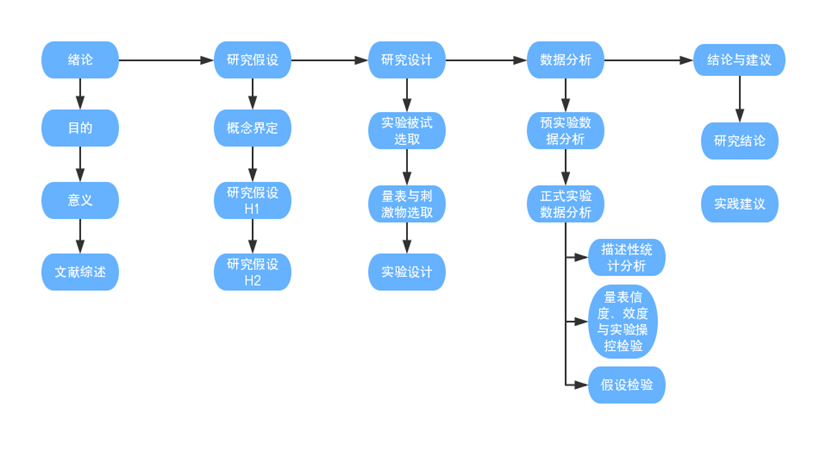情绪对消费者绿色产品购买意愿的影响研究:环境参与度视角毕业论文
2020-02-15 10:44:43
摘 要
当前,绿色消费正逐渐成为当前社会发展中的一个重要问题。随着消费者环保意识的增强,世界上许多公司都在积极开发绿色产品。全球民意调查结果显示:绿色消费市场存在绿色态度-行为差距(Green Attitude– Behaviour Gap)。伴随着绿色消费时代的来临,我国绿色消费产业逐渐发展,消费者购买绿色产品的意愿已成为社会关注的重要问题。
但国内在绿色消费领域购买意愿的研究相对空白。尤其是绿色产品购买意图的影响机制研究空白。
因此,本文未来弥补绿色产品购买意图的影响机制研究的空白,以我国绿色产品(某虚构绿色经济型旅馆)为研究对象,综合运用问卷调查、SPSS统计,响应式分析等方法,运用情景模拟实验的手段,对消费者绿色产品购买意图进行了系统探究。
首先,本文综述了国内外研究现状,并在梳理相关理论的基础上,基于积极心理学的理论框架之下构建了在中国购买绿色产品的意愿的概念模型;随后,论文借鉴国内外研究中较为成熟的量表测量方法,设计了《情绪对消费者的绿色产品购买意愿调查问卷》,并通过预实验,成功进行实验刺激,完成情景模拟实验;然后,论文以绿色产品为例,主要以高校学生为实验对象,对用户的绿色产品购买意愿进行了分析。最后,基于以上研究,提出了提升我国绿色产品购买意愿的相关对策。
本文从消费情境出发,建立了结构方程模型(SEM),研究了情感因素对绿色产品采购意向的影响。
本文通过问卷法和实验法,分析结果表明:中度消极情绪最能激发绿色产品购买意愿。
本文主要创新:以绿色产品购买意愿作为研究对象,并探究情绪对它的调节作用,具有前瞻性;其二,基于环境参与度视角,运用了探索性因子分析方法,基于积极心理学的理论基础,构建了本文的研究模型。并基于绿色产品的情景模拟实验,提出了激发消费者中度消极情绪,从而有效提升绿色产品购买意愿的建议。
该研究将对我国绿色消费产业更好地满足客户购买意愿,提升客户满意度和忠诚度提供有价值的借鉴和参考。
关键词:环境参与度;积极情绪;用户体验;绿色产品购买意图
Abstract
With the advent of the era of green consumption, China's green consumption industry is gradually developing, and consumers' purchase intention of green products has become an important issue of social concern. With the continuous development of economy and the improvement of people's living standard,Users are becoming less sensitive to price.Whoever can mobilize the emotions of consumers and meet the expectations of users can control the initiative of the market.
The deviation between consumers' green attitude and their actual green product buying behavior is one of the main obstacles to the development of green market. Here, Comprehensive use of questionnaire survey method,Comprehensive use of questionnaire survey method,group interview and SPSS statistical analysis, and USES the means of scenario simulation experiment to systematically explore consumers' green product purchase intention.
Firstly, and builds a conceptual model of green product purchase intention in China based on the theories of APEC model of user experience,Then, the paper designs the questionnaire of sentiment on consumers' purchase intention of green products by referring to the relatively mature scale measurement methods in domestic and foreign researches. Through the pre-survey, the measurement factors of green product purchase intention are analyzed and modified to determine the formal survey questionnaire. Then, taking green products as an example and taking college students as research objects, this paper analyzes users' emotions,Put forward the countermeasure that raises green product to buy intention.
This paper aims to explore the formation mechanism of consumers'purchasing intention for green products.So in terms of consumption, the structural equation model is constructed to study the influence of emotion on green product purchase intention.
Through questionnaires and comprehensive experiments, the analysis results show that there is a positive relationship between environmental participation and green product purchase intention. Moderate negative emotions positively regulate the positive relationship between environmental participation and green product purchase intention.
It is forward-looking to take the purchase intention of green products as the research object and explore the regulating effect of emotions on it. Secondly,From the perspective of environmental participation, , this paper USES exploratory factor analysis method and takes positive psychology as the theoretical basis to construct the research model of this paper. The paper puts forward some measures to improve the purchase intention.This research will provide valuable reference for China's green consumption industry to better meet customers' purchase intention and improve customer satisfaction and loyalty.the structural equation model is constructed to study the influence of emotion on green product purchase intention.
Through questionnaires and comprehensive experiments, the analysis results show that there is a positive relationship between environmental participation and green product purchase intention. Moderate negative emotions positively regulate the positive relationship between environmental participation and green product purchase intention.
Key Words:Environmental involvement; Positive emotion; User experience; Purchase intention of green products Quality of service
目录
摘要 I
Abstract II
第1章 绪论 1
1.1背景 1
1.2目的和意义 1
1.2.1理论意义: 1
1.2.2现实意义: 2
1.3国内外文献综述 2
1.3.1国内研究现状 2
1.3.2国外研究现状 2
1.4基本内容与目标 2
第2章 研究假设 4
2.1概念界定 4
2.1.1环境参与度 4
2.1.2情绪 4
2.1.3绿色产品购买意图 4
2.2研究现状与假设 4
2.2.1研究现状 4
2.2.2假设H1 4
2.3情绪与绿色产品购买意图 4
2.3.1研究现状 5
2.3.2假设H2 5
2.4构建研究模型 5
第3章 研究设计 6
3.1实验被试选取 6
3.2量表与刺激物选取 6
3.3实验设计 7
第4章 数据分析 11
4.1预实验数据分析 11
4.2正式实验数据分析 12
4.2.1描述性统计分析 12
4.2.2假设检验 13
第5章 研究结论与实践建议 14
5.1研究结论 14
5.2理论贡献与管理启示 14
5.3研究局限与展望 15
参考文献 16
致 谢 18
第1章 绪论
1.1背景
大气污染、 水环境污染、 垃圾处理、 土地荒漠化和沙灾、 水土流失、 旱灾和水灾、生物多样性破坏等环境问题日益突出。意想不到的环境灾难逐渐唤起了人们的环保意识。随着人们环保意识的觉醒,世界上许多公司都在积极开发绿色产品。绿色产品由于具有绿色属性,溢价能力高,成为全球公司研发关注的焦点。
伴随着绿色消费时代的来临,我国绿色消费产业逐渐发展,消费者购买绿色产品的意愿已成为社会关注的重要问题。绿色消费是指消费者行为受环境保护理念的驱动,从而减少对环境的不利影响的一种消费行为。
随着消费者环保意识的增强,世界上许多公司都在积极开发绿色产品。例如,庄臣公司改进了生产工艺,消除了产品配方中的不良物质,这是造成“白色污染”的主要原因。Hewlett-Packard通过以手提箱的形式销售笔记本电脑,降低了包装成本。根据一项调查显示:大多数消费者并没有和购买绿色产品的实际行动。因此,绿色消费市场存在着: “知识与行动脱节”的困境。学术界称之为绿色态度-行为差距(Green Attitude– Behaviour Gap)。
为什么会造成以上这种差距呢?
(1)态度和行为偏差导致企业的单向信号机制中的消费者失败,导致是否开发绿色产品的混淆。在绿色消费市场,高风险很难弥补高利润,这样就会导致这些开发公司陷入市场和财务的两难境地。
(2)实际困难往往迫使企业转向象征性的环境行为。
国内外学者试图从消费者和企业的角度分析偏离的原因。
从消费者角度,消费者还没有把环保意识转化为对绿色产品的购买意愿以及实际行动中,因为会造成这种绿色态度-行为差距的这种偏离。
从企业角度研究侧重于绿色消费的溢价。
综上所述,消费者对于环境问题的态度会影响消费者对绿色产品的购买意愿。因此,本文将通过查阅文献的方法构建影响绿色产品购买意图的概念模型。
1.2目的和意义
1.2.1理论意义:
(1)摆脱绿色消费市场发展困境
绿色消费市场面临长期发展困难。
(2)填补相关领域研究空白
绿色消费购买意愿的形成机制在学术界研究成果不足。
1.2.2现实意义:
(1)响应国家政府的战略部署,促进绿色消费。
中国政府出台了“推进绿色消费指导意见”等一系列重要文件,新部署,新安排和新战略。
(2)提升居民绿色消费行动。
2018年,绿色食品在中国的销售额不到食品总支出的十分之一。
1.3国内外文献综述
国内外学者试图从环境参与度视角来研究绿色产品购买意愿,从而探究其影响机制。
1.3.1国内研究现状
(1)环境参与度:高键指出,在绿色消费领域,与环境有关的个人更愿意接受和处理与环境有关的信息。
Hu认为环境参与度是显著影响消费者广告接受绿色产品、环境参与高消费者接受和信任更高的绿色产品广告,
道德情感不同于基本情感,它是指与人类福祉相关的情感,而不仅仅是评价主体的福祉。
1.3.2国外研究现状
(1)环境参与度:Schuhwerk等人将环境参与度定义为消费者关心环境并愿意为保护环境做出努力的程度。
(2)意图:Ajzen认为意图是指一个人倾向于采取某种特定的行为。意图可以预测特定行为的可能性以及个人愿意为之付出的努力程度。
1.4基本内容与目标
论文目标:探究情绪对绿色产品购买意愿的影响机制。
基本内容:
从消费情况出发,研究情绪对绿色产品购买意愿影响,通过综合实验和问卷调查对假设和分析结果进行了验证。

图1.1 本文技术路线图
第2章 研究假设
2.1概念界定
2.1.1环境参与度
参与度是用来确定交通事故中不良后果与事故关系的个指标。
本文借鉴这一概念提出了环境参与度。
学者将消费者愿意为保护环境而做出努力的程度成为环境参与度。
2.1.2情绪
个体在面对不同的突发刺激时会自动产生一种神经反应,在心理学上,把这一现象称之为情绪。
2.1.3绿色产品购买意图
绿色产品购买意图是指个体愿意为购买绿色产品所付出的努力程度。
2.2.1研究现状
通常,在一般性商品消费过程中,价格的作用不明显。因此,消费过程较少用价格这一指标来评估商品。
情感是消费决策过程中的一个重要因素。
相反,有消极情绪的消费者对产品和消费过程更消极,不太可能产生再消费和推荐的意愿。同时,激发程度不同的情绪对绿色产品的购买意愿的刺激作用也相应不同。
2.2.2假设H1
积极情绪的消费者难以意识到环境保护的重要性,往往会忽视环境问题,难以意识到环境保护的重要性,不利于绿色产品购买行为。
据此,本文提出以下假设:
H1:受到积极情绪支配的消费者有利于产生消费者绿色产品的购买意图
H1a:中度积极情绪有利于激发消费者绿色产品的购买意图。
H1b:高度积极情绪不利于激发消费者绿色产品的购买意图。
2.3情绪与绿色产品购买意图
2.3.1研究现状
当消费者处于中度消极情绪时,对环境问题高度敏感,能够有效、快速地接受和理解与环境相关的信息,从而产生更高的保护环境的意愿。
2.3.2假设H2
中度和高度情绪对绿色产品购买意图产生重大影响。因此,可以合理推测:高度消极情绪不利于激发消费者绿色产品购买意图。
假设如下:
H2:受到消极情绪支配的消费者不利于产生消费者绿色产品的购买意图
H2a:中度消极情绪有利于激发消费者绿色产品的购买意图。
H2b:高度消极情绪不利于激发消费者绿色产品的购买意图。
综上所述:本文提出以下研究假设:
H1:受到积极情绪支配的消费者有利于产生消费者绿色产品的购买意图
H1a:中度积极情绪有利于激发消费者绿色产品的购买意图。
H1b:高度积极情绪不利于激发消费者绿色产品的购买意图。
H2:受到消极情绪支配的消费者不利于产生消费者绿色产品的购买意图
H2a:中度消极情绪有利于激发消费者绿色产品的购买意图。
H2b:高度消极情绪不利于激发消费者绿色产品的购买意图。




